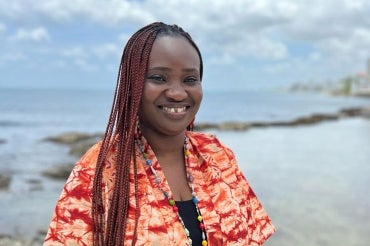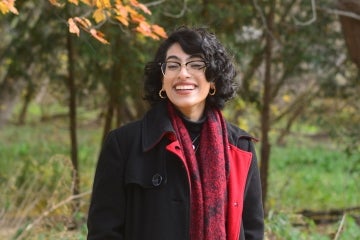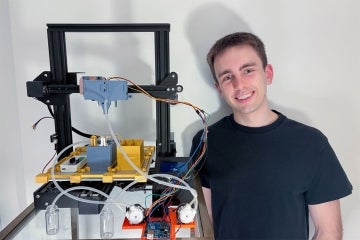Using smartphones, U of T PhD candidate works with Nigerian women to protect communities

Wumi Asubiaro Dada's PhD project involves working with local organizations and women in Nigeria to protect their home communities through the use of geospatial imagery and a mobile app (photo courtesy of Wumi Asubiaro Dada)
Published: August 2, 2023
Growing up in Nigeria, Omowumi (Wumi) Asubiaro Dada was outspoken, argumentative and animated by injustice.
It was obvious to her family what path her life would take: “They always said, we know you’re going to be a lawyer,” she says of her career in human rights law and feminist advocacy that has spanned two decades.
Now as a PhD candidate at the Centre for Criminology & Sociolegal Studies in the University of Toronto’s Faculty of Arts & Science, Dada is working with local organizations and women in Nigeria to help them achieve justice by protecting their home communities through the use of modern technology – work that is being supported by a Connaught PhDs for Public Impact Fellowship.
In particular, she’s helping women in Kaduna – one of Nigeria’s 36 states – become a major force in conflict prevention and resolution. Dada worked with her PhD supervisor Kamari Maxine Clarke, a distinguished professor in the department of anthropology, and a local organization known as the CLEEN Foundation to create a project called the Early Warning Early Response (EWER). The system trains villagers, including women, to use publicly available geospatial imagery to identify planned attacks before they happen. A mobile app then sends push alerts to warn others to be prepared.
So far, 120 women have been trained on EWER since it was launched in 2021.
“They’ve been able to get information across, which, in some cases, has led to a de-escalation of violence,” says Dada. “And when there is a trigger, meetings are called. One of the conditions of these meetings is that women must form part of the quorum, which has increased their participation in decision-making in conflict prevention. Another effect is that women have brought other women into the fold.”
Dada believes that women can play a prominent role in defusing violence, which is a massive problem in Nigeria’s northern region. That includes kidnapping, sexual assault, village burnings and murder.
The sources of violence are complex and varied, Dada explains. “Kaduna in particular is very unsafe,” she says. “The violence there started as religious and ethno-communal clashes, with many reprisals and counterattacks and has now changed in dynamics to kidnapping, village burning with various violations such as murder and sexual assault.”
Climate change has also played a role.
“A lot of land has been affected by desertification,” Dada says. In the Lake Chad Basin across the border, “people who make their living by herding cows have lost their livelihood and become desperate, which has also led to crime.”
In all these cases, she notes, the voices of women are regularly ignored. “This is because they’re not considered part of the problem. And because they bear the brunt of much violence, they’re simply considered victims. I’m pushing the argument that we need to recognize the agency of women – it’s important that they be part of the solution.”
Dada adds that communities in Nigeria often left to fend for themselves with no assistance. Established in the days of colonial rule, the male-dominated police force is, like other units of the justice system, located far away and lacks the resources to properly assist rural communities, she says. This has resulted in widespread vigilantism – which can mean defensive violence, but also the prevention of crime before it happens.
This is where women come in.
“There’s a lot happening in the domestic sphere that is actually political,” she says. “Women often hear things being planned before anyone else hears about it. And women can influence the actions of others.” Dada points out that in pre-colonial society, women’s roles as keepers of knowledge, leaders of ritual and even warriors were far more respected than they are today. In her own Yoruba tradition, for example, many deities were female – which had a general effect on how human women were perceived.
Dada began her post-secondary studies immediately after high school and was practising law by age 21.
“At first, I worked in public interest litigation and human rights education, mostly representing incarcerated prisoners awaiting trial,” she says, noting this, too, is a critical problem in Nigeria, where the system is badly underfunded and some prisoners are held in congested facilities without bail for decades.
It was just one of the many problems Dada confronted in Nigeria’s legal system over the years – experiences that prompted her to identify the plight of women and make significant contributions to the women’s movement. That includes designing and managing a wide range of projects for non-governmental organizations, government and international development agencies.
As part of her current work, Dada seeks to advance Nigerian women’s participation at all levels of community justice administration. In addition to crime prevention, she is exploring restorative justice: examining the root causes of crime, and how best to reintegrate those who have offended back into society.
One of her Connaught Fellowship aims will be to present her findings at the annual meeting of the United Nations Commission on the Status of Women next year. There, she hopes to show how women’s work in domestic life should not be dismissed – but appreciated for its value in political and public life.
She says her PhD studies are helping her realize her community justice goals.
“If you have your sights set on changing structural inequality, this qualification can help you do that,” she says. “I’m engaging with ways to amplify the voices of people who would not ordinarily have the opportunity to make an impact on the structures that control their lives.”



